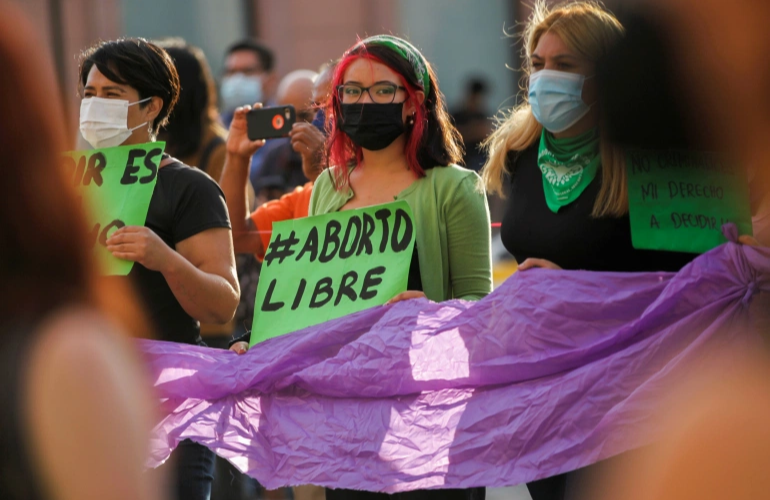
The Mexican court's decision on Tuesday follows moves to decriminalise abortion at the state level, although most of the country still has tough laws in place against women terminating their pregnancy early [Daniel Becerril/Reuters]
Mexico City, September 8 (RHC)-- Mexico’s Supreme Court has ruled that it is unconstitutional to penalise abortion, a major victory for women’s health and reproductive rights that comes amid a “green wave” of abortion decriminalization in Latin America.
The Mexican court’s decision on Tuesday follows moves to decriminalise abortion at the state level, although most of the country still has tough laws in place against women terminating their pregnancy early.
“This is a historic step for the rights of women,” said Supreme Court Justice Luis Maria Aguilar.
The court unanimously annulled several provisions of a law from Coahuila – a state on the border with the U.S. state of Texas – that had made abortion a criminal act, and its decision will immediately only affect the northern border state.
But it established “obligatory criteria for all of the country’s judges”, compelling them to act the same way in similar cases, said Supreme Court President Arturo Zaldivar.
The decision came amid a wave of abortion rights victories in Latin America, including in Argentina, where the Senate late last year voted to legalise elective abortions until the 14th week of pregnancy.
Ecuador in April legalised abortion in cases of rape, while women’s rights advocates in other countries in the region – where the Catholic Church continues to wield a strong influence – are pushing to loosen restrictive abortion laws, as well.
But several US states have recently taken steps to restrict women’s access to abortion, particularly Texas, which last week enacted the strictest anti-abortion law in the country after the U.S. Supreme Court declined to intervene.
Civil and immigrant rights groups have denounced the Texas law, which bans abortions after six weeks of pregnancy.
They say Black women and other minorities, as well as women in low-income communities, will be hardest hit by the prohibition – and at least one group, the Refugee and Immigrant Center for Education and Legal Services (RAICES), has said it will not abide by the legislation.
“RAICES assisted and gave financial support to immigrants seeking abortion in Texas for years, and will continue to do so – no matter what,” RAICES CEO and President Jonathan Ryan said in a statement last week.
Meanwhile, the Mexican ruling on Tuesday opens the door to the possibility for the release of women incarcerated for having had abortions. It could also lead to US women in states such as Texas deciding to travel south of the border to terminate their pregnancies. Mexican reproductive rights group GIRE hailed the court’s decision as “a historic move.”
Al Jazeera’s Manuel Rapalo, reporting from outside the Supreme Court in Mexico City on Tuesday evening, said the decision “sets in motion a precedent that would decriminalise abortion in the rest of the country.”
“In broader terms, what this means is that Mexico becomes the fourth country in Latin America to seek decriminalisation of abortion,” Rapalo said. In July, the Mexican state of Veracruz became just the fourth of the country’s 32 regions to decriminalise abortion. The other 28 states penalise abortion with some exceptions. Rapalo added that while the Supreme Court’s ruling is final, pushback is expected.
“We cannot lose sight of the fact that Mexico is one of the most catholic countries in the world,” he said. “We should expect that in many of the more conservative parts of the country this decision by the Supreme Court is not going to be a welcome decision.”

